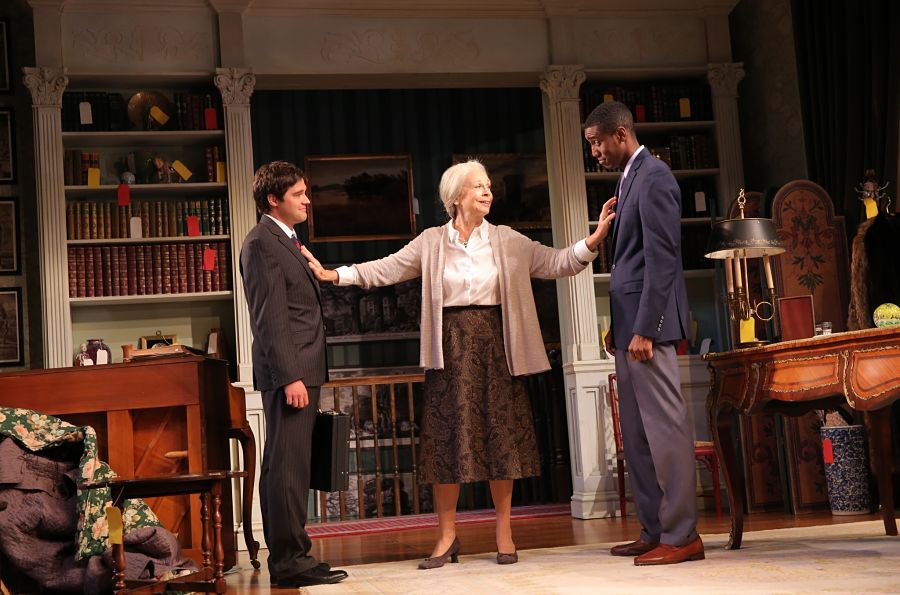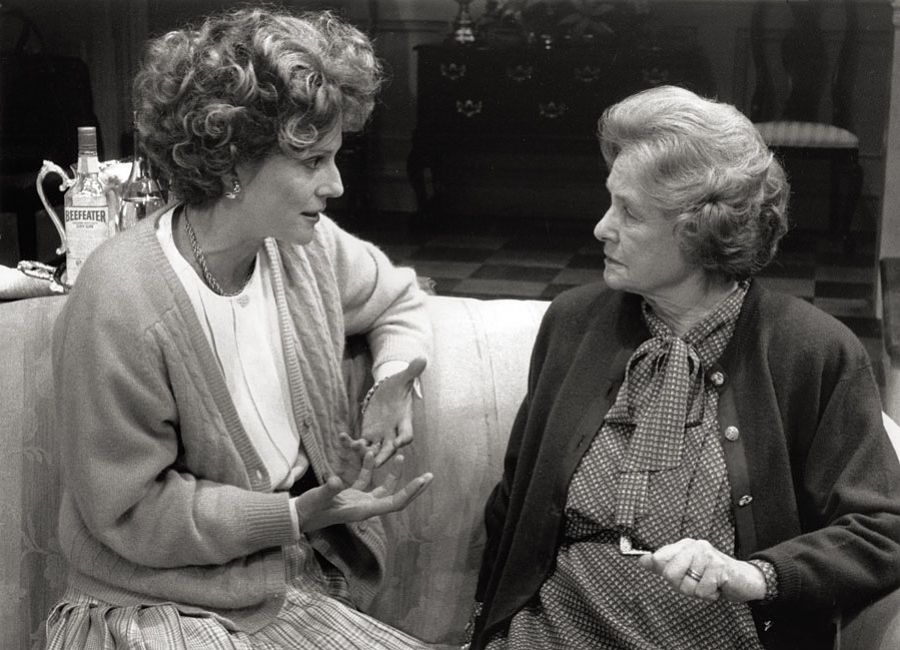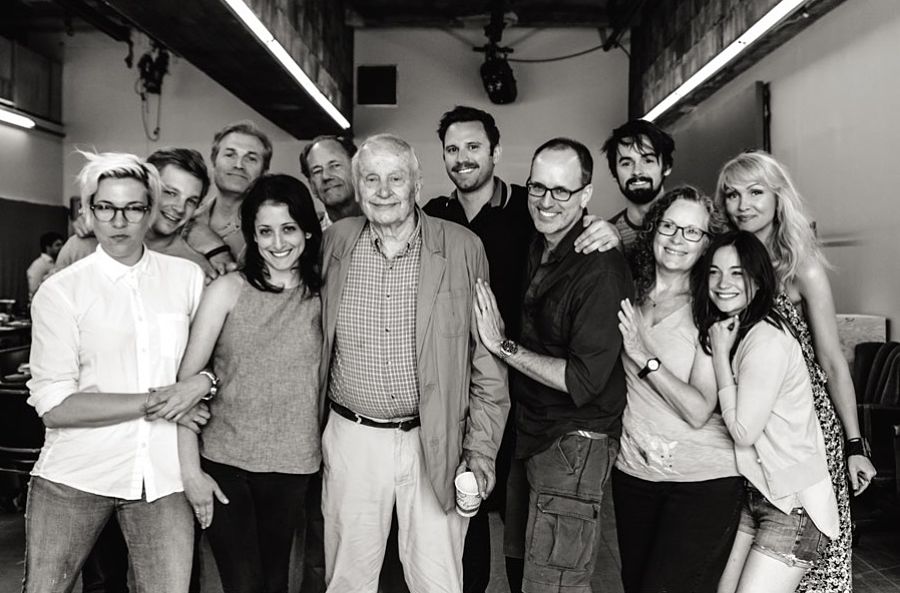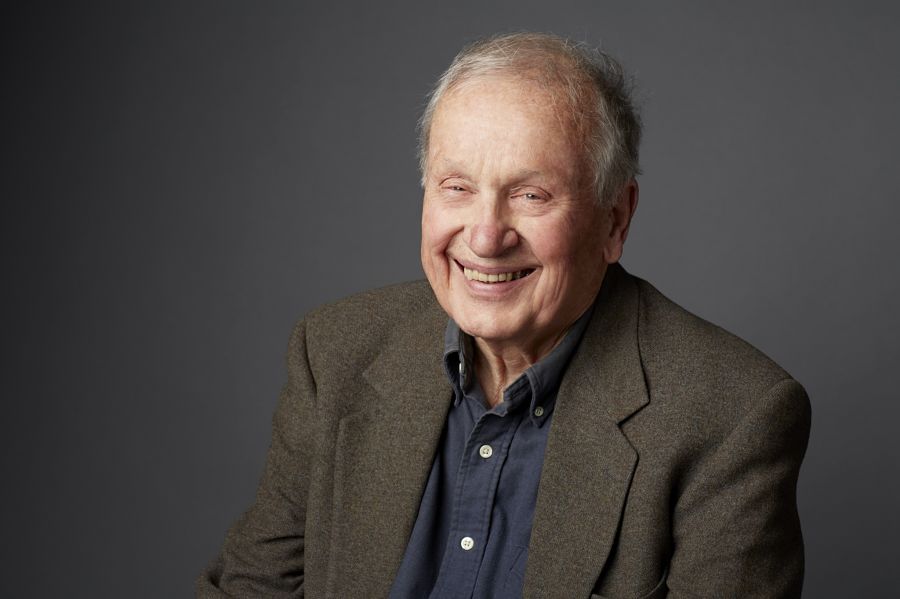Standing with A.R. Gurney in the garden area outside Connecticut’s Westport Country Playhouse on a summer night evokes a profound feeling of déjà vu. Thirty-one years ago, I met Gurney just after graduating college and beginning a summer job at the Playhouse, when Westport produced 11 shows in 11 weeks. Gurney was a frequent guest during that time, when the theatre also produced his play The Middle Ages.
I’ve seen Gurney, born Albert Ramsdell Gurney Jr. but known to all as Pete, in countless theatre lobbies since then, often near his Connecticut home—at Hartford Stage, where I was public relations director for eight years, during which time the theatre mounted Children and the premiere of The Snow Ball; at Long Wharf Theatre, where his Love Letters had its first sustained production and where I saw it performed by, most notably, Jessica Tandy and Hume Cronyn; and in New York City at the Flea Theater, at Primary Stages, at Lincoln Center.
Gurney, of course, is the enormously prolific author of more than 40 plays, including The Dining Room, The Cocktail Hour, The Perfect Party, and Sylvia, which is being revived this month on Broadway. Our meeting in the Westport garden was on the occasion of an “invited performance” of his newest play, Love and Money, which would officially premiere several weeks later at New York’s Signature Theatre.
Pete has let it be known that Love and Money might be his last play, as he turns 85 next month, but he’s been dropping not-so-subtle hints about retiring for at least four years.

We spoke again in his Manhattan apartment a few days later. He’d moved there just a week before, downsizing from his longtime prior home a block away. As in Michael Yeargan’s set for Love and Money, there were packing boxes here and there, a sign of transition in any life—in the play, a home being closed up, but here a new home just beginning to be filled.
HOWARD SHERMAN: So, Pete, is Love and Money really going to be your last play?
A.R. GURNEY: Well, you know, you can’t predict your own psyche to that degree. Playwriting is such a habit with me now. I’ve written an awful lot of plays. You can’t tell what ideas will suddenly strike you.
Jim Houghton [Signature’s artistic director] said, “We want to revive two of your older plays,” and he named the two that I thought would work, and added, ‘We want you to provide a new play at the end.” And I said “A new play? Jim, I’m 84 years old, I don’t think I can whomp up one,” but I did, and it turned out to be a particularly rewarding experience.
What was so rewarding?
I found myself reverting to habits that I really hadn’t done in quite a while. I wrote plays, I’d occasionally change a line or two, but I knew just what I was doing. This one I didn’t know quite what I was doing, and as the play developed, I changed the nature of it. We added characters—I felt like a kid starting out again, and thank God for [Westport artistic director] Mark Lamos’s tolerance of me, and thank God we still have time at Westport where we can fool with it a little bit.
I noticed a lot of references in Love and Money, both explicit and subtle, to other plays of yours. Does it help if an audience knows your other work?
I found I was footnoting myself as I went along. If the audience wants to make those connections, I’m delighted, but I hope the play isn’t dependent on it. I’m trying to think of other examples in drama and elsewhere where writers have done that, alluded to themselves. Faulkner does it, but I’m no Faulkner.

In 1982, when The Dining Room became your most widely produced play to date, you were already over 50, but you’d been writing since the 1960s. In that sense, you’d been an emerging playwright for an awfully long time.
The Dining Room was an experience full of luck. There just happened to be a slot open in the 60-seat upstairs theatre at Playwrights Horizons, and I had just happened to meet David Trainer, who was looking for something to direct. The play was successful artistically and we managed, with luck, to get some excellent actors in it.
But then there was much more luck involved. The downstairs theatre at Playwrights Horizons opened up. I said to André [Bishop, then-artistic director of the company], “I just don’t think we can move downstairs, 120 seats—I don’t think we can do it.” But one thing led to another. Roger Stevens happened to see it and wanted to put it on at the Kennedy Center, so there was luck in availability of space, and coincidence in availability of actors.
It wasn’t a play that just knocked everyone off their feet—some people didn’t like it at all. If you look at the original review of The Dining Room, it was way in the back of the Times. If that was a breakthrough, it was on rather unusual terms. On the other hand, I enjoyed the experience so much, of writing it, of doing it, and because it was beginning to make a little money, I decided I could leave teaching alone.
You taught literature at MIT, not a liberal arts college and certainly not an arts school. Besides an income, what did teaching give you?
In the end, I learned a lot. I was an English major at Williams College, and it was a very narrow major—I didn’t read around a lot. At MIT I was forced to read classical literature, philosophical argument, Pascal and Descartes, and I had to talk about it with extremely bright students.
So what was the appeal? Just the sense that I was learning a lot in the course of teaching, and performing a lot. As a teacher at MIT, your classes don’t pretend, and they’re eager to learn, or at least I felt they were. But you have to keep them interested. They’ve all been up to the wee hours of the morning doing their problem sets and experiments. You have to become a good theatrical teacher in order to survive.
In your work, you often take off from other literature—the Bible, the classics, Shakespeare. What’s the affinity?
In the first place, most of the stories, whether from the classics or from the Bible, were pretty good stories. What I didn’t realize was that these were at the heart of the traditional WASP culture, these things we had to learn in Sunday school, these plays we had to read at school. As I continued to write, I came to realize that I’m not just trying to swipe a plot that seemed important in the past, but that I’m really writing about Western culture as it was embraced by the WASP culture.
Maybe I was trying to hit common denominators. I felt in order to speak to another human, you have to put your arm around them and say, “We all agree on this story, we’ll agree on this plot, so let’s all work together.” The Golden Fleece really dealt with suburban culture, and what was going on was that men and women were waking up to their responsibilities as parents and their dreams of being more than just parents.
While you were tagged as the great chronicler of WASP culture, you weren’t necessarily celebrating it. You were writing about its downfall and perhaps not regretting that.
Even at the end of Love and Money, I celebrate aspects of WASP culture that I hate to see go—but yes, that’s why my parents really didn’t like what I was doing. They felt I was just poking fun at things they took very seriously. I’d always been the wise guy in the family. I’d always been the outsider making wisecracks at the dinner table, and I found I could do that better on the stage. I didn’t realize to what degree the WASP culture was bankrupt, and I think it is—culturally bankrupt, not financially bankrupt—until really the past three, four, five years. I was just trying to write about what it was and how silly it was in some ways, and one thing led to another.
There are characters in your plays who seem like they might be you—a young man or grown man from Buffalo, N.Y. Were you ever writing veiled autobiography?
I was not absolutely hamstrung by trying to repeat history, but I was aware of some of the characters, such as in Indian Blood or the son in The Cocktail Hour, being like me.
There was a wonderful production of The Cocktail Hour at the Huntington—the character of the young man in that was played by James Waterston, a wonderful actor—and for some reason the play became his story, more than the mother’s or the father’s, maybe because the actors were generous enough to give it to him. His story was extremely moving to me. My son saw the opening and said, “Don’t go near it, Dad, they don’t know what they’re doing.” I went down and saw it anyway and thought they knew exactly what they were doing.
So many of your plays are set in Buffalo. Is it the real Buffalo, or the Buffalo of your mind?
It was my home, although it’s like Dante’s Florence. Dante wrote the Divine Comedy not while living in Florence—he was banished from Florence—but he grew up there, and it was at the heart of his thinking, and he used it as a way of saying very general things about the world. Well, Buffalo, for many reasons, was very influential in my life. My parents, my grandparents, in some cases my great- grandparents, were born there. My great- great-grandfather was one of the first mayors of Buffalo. My wife comes from Buffalo and her family comes from there. So there’s a tribal pressure there, and the story of Buffalo as it changed from an aggressive, vibrant town to a town which is trying to decide what it’s going to be and do next is a general story.
You have worked often with a relatively small core of directors: Daniel Sullivan, Jack O’Brien, Joey Tillinger, Mark Lamos, Jim Simpson, David Saint, and David Trainer. Is there a benefit to that?
We knew each other so well that we could talk easily with one another. But I’ve had very good experiences with other directors. Lila Neugebauer, who directed [Signature’s] Wayside Motor Inn, which had been a real loser of a play—she just brought it to life. I worked with Kim Rubenstein on The Cocktail Hour at Long Wharf, and she was terrific, but she had a very different slant. So I don’t think it’s always important that you work with someone who’s in the same world that you are or who knows what your work should be like. I think Arthur Miller would say the same thing.

What did you think of Jim Simpson’s deconstruction of What I Did Last Summer this past spring at Signature?
When Jim decided to have a drummer onstage and when Michael Yeargan said, “We just want rear-screen projection on paper, the paper of the script,” I said, “Oh, God, that’s not what I had in mind at all.” But I didn’t say, “Knock it off.” I went to a rehearsal and looked at it and thought, “It’s sort of interesting. I’m sort of taken up by this.”
I hope I’m not so old that I can’t respond to change if somebody else wants to do it. But I can’t suddenly change the way a play should be done. That’s the director’s job. And if there’s any kind of argument in its favor, the director has to make it and I’ll try to go along with it.
Take Mark Lamos’s recent production of The Dining Room [at Westport]. When I first saw a rehearsal I said, “It’s a terrific cast, Mark, but it’s not the way I envision it. The dining room table and the scenery is all powder blue. What’s going on? I assume it’s just a rehearsal table.” And he said, “No. What you see is what you get.” Under lights, the way people entered and exited without giving a hint of what the world outside is like, it all worked beautifully. I never would have thought of it myself. But I hope I’m smart enough to know that there are many ways to skin a cat.
Sylvia is only your fourth play to reach Broadway, but your plays have had such success in smaller venues. Was Broadway ever something you wanted?
I’ve never had much luck on Broadway. Lord knows I’d be a fool if I didn’t want to have a play on Broadway. But with Sweet Sue, for example, without Mary Tyler Moore and Lynn Redgrave selling the tickets, it would have closed after a week.
I do think my subjects are not necessarily what Broadway has traditionally been interested in. The pressures of adjusting the script, as we had to with Sweet Sue and again with The Golden Age, which lasted I think two weeks, it just hasn’t appealed to me.
I have to feel compatible and congenial with the audience. I have to feel that these people are people like me, who have some of the same concerns and interests and that’s why they’re at the theatre. As I look around at a Broadway audience, and I hope this changes in Sylvia, I don’t see that many people of whom I can say, “Oh, I’m glad that person is here, I hope I can speak to him or her.”
Though we’ve talked about Jim Simpson, we haven’t talked about your work at the Flea, which has done eight of your plays, making you, as I’ve said before, the hottest 75-year-old Off-Off-Broadway playwright around. What’s the draw?
You know, a lot of people tease me because I’m always sure I’ve written my last play.
I got a call from Swoosie Kurtz, who was performing in The Guys, and she said, “You’ve got to get down here, it’s a terrific play and the whole Flea Theater situation is very interesting.”
And I liked the play very much, I liked Swoosie very much, and I liked Jim Simpson very much.
So I found myself surrounded by younger people, theatres that were available all around me. A lot was happening politically in our country, mostly bad, and I found myself wanting to write with and for these young actors. It was a very refreshing experience for me.
And before too long, I’ll have another play there.


